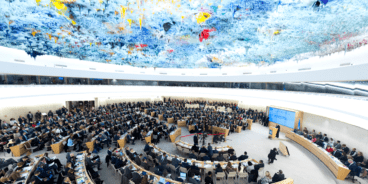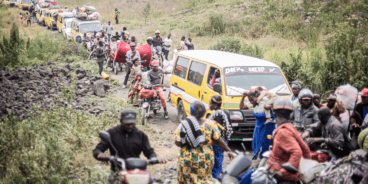
Atrocity Alert No. 67: Democratic Republic of the Congo, Kenya and Iraq
Atrocity Alert is a weekly publication by the Global Centre for the Responsibility to Protect highlighting situations where populations are at risk of, or are enduring, mass atrocity crimes.
Democratic Republic of the Congo
The Office of the UN High Commissioner for Human Rights (OHCHR) released a report on 4 August documenting crimes perpetrated against civilians in the Kasai region of the Democratic Republic of the Congo (DRC). According to the report, between 12 March and 19 June an estimated 251 people were victims of extrajudicial and targeted killings, including 62 children. Since January the UN has identified at least 80 mass graves in the Kasai region, while the Catholic Church in the DRC believes over 3,000 people have been killed. While the majority of the mass graves have been blamed on the security forces, the anti-government Kamuina Nsapu militia has also been accused of killing soldiers, police and government officials and has used child soldiers in attacks.
Survivors of violence in the Kasai region have indicated that DRC security forces and local officials have sometimes actively fomented ethnic violence. The security forces have also been implicated in the formation of another militia, Bana Mura. Since early 2017 Bana Mura has launched a series of deadly attacks aimed at eliminating ethnic Luba and Lulua populations in the region, who are perceived as being supportive of Kamuina Nsapu.
The UN High Commissioner for Human Rights, Zeid Ra’ad Al Hussein, has called upon the DRC government to “take all necessary measures to fulfill its primary obligation to protect people from all ethnic backgrounds.” The DRC government must cooperate with the international team of experts dispatched by OHCHR to investigate human rights violations in the Kasai region. The OHCHR team must be granted safe access to mass graves and other relevant sites and individuals.
Kenya
Last week, on 8 August, Kenyans went to the polls to vote in general elections, including electing the country’s president. On 11 August the Independent Electoral and Boundaries Commission formally declared incumbent President Uhuru Kenyatta the winner, having garnered 54 percent of the votes in an election that has been viewed as largely credible by the international community. Immediately following the announcement, opposition supporters protested in several cities, with reports of some individuals looting and destroying property. President Kenyatta’s main political rival, Raila Odinga, has continued to publicly contest the results and has called for his supporters to participate in a general strike. On 16 August Odinga announced his intention to challenge the results in the Supreme Court.
So far, clashes between opposition supporters and police have resulted in at least 24 people killed since election day. In several instances, police reportedly used excessive force against protesters, including using live rounds and tear gas to disperse crowds.
One week after the election, it is imperative that Kenyans maintain vigilance and refrain from inciting further conflict or political instability. Odinga and other candidates wishing to dispute election results must work through legal avenues in Kenya’s courts. The government must ensure that the security forces exercise maximum restraint regarding the use of deadly force when responding to protests.
Iraq
On 15 August the UN Secretary-General transmitted a letter from the Minister of Foreign Affairs of Iraq to the UN Security Council (UNSC) requesting international assistance to pursue accountability for atrocities perpetrated by the so-called Islamic State of Iraq and the Levant (ISIL). When ISIL swept across northern Iraq in 2014 it launched a systematic campaign of mass atrocity crimes against civilians, especially those from minority religious communities. Despite the genocide perpetrated against the Yazidi and atrocities inflicted upon other communities, no member of ISIL has been held accountable in a court of law.
The letter notes that Iraq and the United Kingdom are currently drafting a UNSC resolution. The draft resolution should call for the establishment of an international investigative commission to collect and protect evidence of mass atrocity crimes perpetrated by ISIL in Iraq. The draft resolution should immediately be circulated to UNSC members and adopted as soon as possible. Since 2014 the Global Centre for the Responsibility to Protect, the Yazidi survivors’ organization, Yazda, and other NGOs have campaigned for the establishment for an international justice mechanism in Iraq.
Related Publications


Atrocity Alert No. 425: Democratic Republic of the Congo, Afghanistan and Holocaust Remembrance Day
